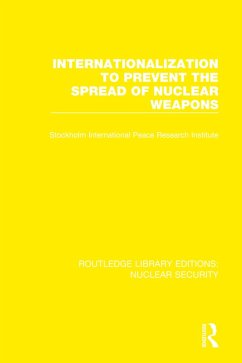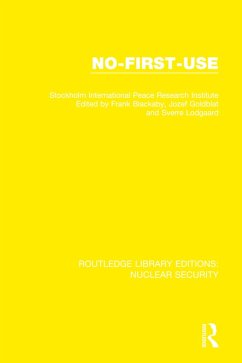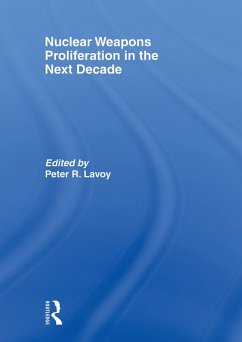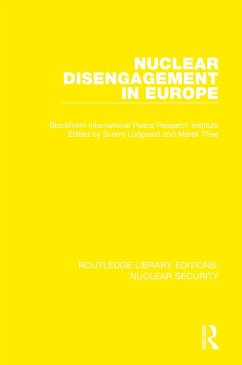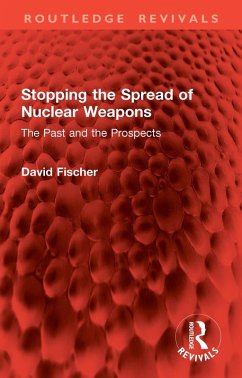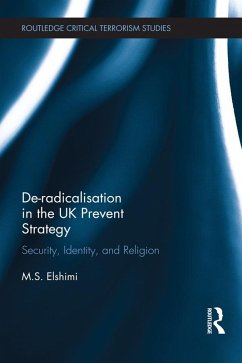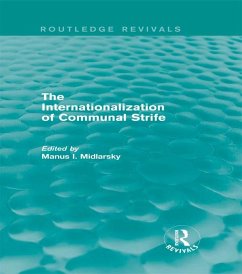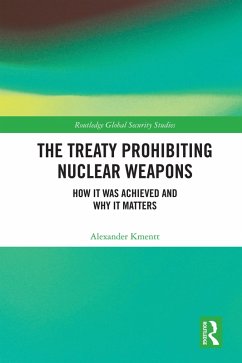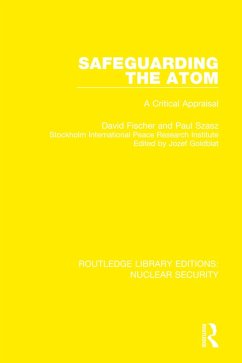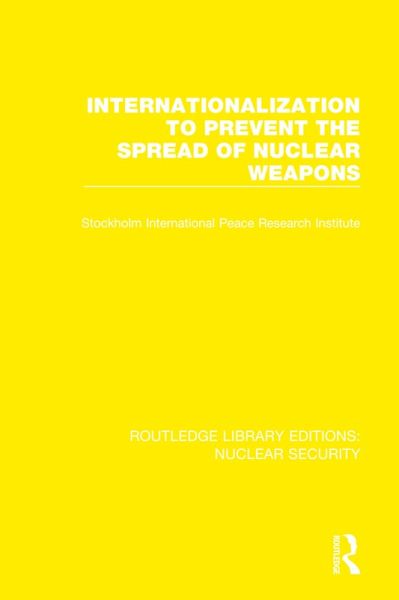
Internationalization to Prevent the Spread of Nuclear Weapons (eBook, PDF)
Versandkostenfrei!
Sofort per Download lieferbar
32,95 €
inkl. MwSt.
Weitere Ausgaben:

PAYBACK Punkte
16 °P sammeln!
First published in 1980, the original blurb read:In August - September 1980 the second Review Conference of the Non-Proliferation Treaty (NPT) will take place in Geneva. As this Treaty is the most important barrier to the proliferation of nuclear weapons, the results of the Conference will obviously have major effects in the field of arms control and disarmament.The implications of the recent International Nuclear Fuel Cycle Evaluation (INFCE) are that the technological capabilities of many countries are such that there is no technical solution to the problem of the spread of nuclear weapons t...
First published in 1980, the original blurb read:
In August - September 1980 the second Review Conference of the Non-Proliferation Treaty (NPT) will take place in Geneva. As this Treaty is the most important barrier to the proliferation of nuclear weapons, the results of the Conference will obviously have major effects in the field of arms control and disarmament.
The implications of the recent International Nuclear Fuel Cycle Evaluation (INFCE) are that the technological capabilities of many countries are such that there is no technical solution to the problem of the spread of nuclear weapons to countries that do not now have them. Thus, it appears that if there is a solution at all, it must be political in nature.
A possible element in such a political solution is the internationalization of the sensitive parts of the nuclear fuel cycle; that is, those parts that have the potential of producing fissile materials to make nuclear weapons. Although the intricacies of a system of internationalization are still unresolved, the concept, if realized, would provide another powerful political barrier to nuclear weapon proliferation - a reinforcement for the aims of the NPT itself.
Against this background, and as a follow-up to its first symposium and the resultant book, Nuclear Energy and Nuclear Weapon Proliferation, SIPRI convened a second international group of experts to continue its discussions of issues pertinent to the forthcoming NPT Review Conference. The meeting took place at SIPRI in Stockholm, 31 October - 2 November 1979, when the feasibility of internationalizing the nuclear fuel cycle was examined.
SIPRI's views on this complex approach are expressed in Part 1 of this book - Internationalization to Prevent the Spread of Nuclear Weapons. Part 2 contains the papers that were presented at the symposium.
In August - September 1980 the second Review Conference of the Non-Proliferation Treaty (NPT) will take place in Geneva. As this Treaty is the most important barrier to the proliferation of nuclear weapons, the results of the Conference will obviously have major effects in the field of arms control and disarmament.
The implications of the recent International Nuclear Fuel Cycle Evaluation (INFCE) are that the technological capabilities of many countries are such that there is no technical solution to the problem of the spread of nuclear weapons to countries that do not now have them. Thus, it appears that if there is a solution at all, it must be political in nature.
A possible element in such a political solution is the internationalization of the sensitive parts of the nuclear fuel cycle; that is, those parts that have the potential of producing fissile materials to make nuclear weapons. Although the intricacies of a system of internationalization are still unresolved, the concept, if realized, would provide another powerful political barrier to nuclear weapon proliferation - a reinforcement for the aims of the NPT itself.
Against this background, and as a follow-up to its first symposium and the resultant book, Nuclear Energy and Nuclear Weapon Proliferation, SIPRI convened a second international group of experts to continue its discussions of issues pertinent to the forthcoming NPT Review Conference. The meeting took place at SIPRI in Stockholm, 31 October - 2 November 1979, when the feasibility of internationalizing the nuclear fuel cycle was examined.
SIPRI's views on this complex approach are expressed in Part 1 of this book - Internationalization to Prevent the Spread of Nuclear Weapons. Part 2 contains the papers that were presented at the symposium.
Dieser Download kann aus rechtlichen Gründen nur mit Rechnungsadresse in A, B, BG, CY, CZ, D, DK, EW, E, FIN, F, GR, HR, H, IRL, I, LT, L, LR, M, NL, PL, P, R, S, SLO, SK ausgeliefert werden.




